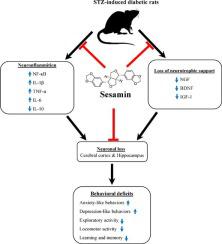International Immunopharmacology ( IF 4.8 ) Pub Date : 2021-01-10 , DOI: 10.1016/j.intimp.2020.107356 Shahab Ghaderi 1 , Masome Rashno 2 , Ali Nesari 3 , Seyed Esmaeil Khoshnam 2 , Alireza Sarkaki 2 , Layasadat Khorsandi 4 , Yaghoob Farbood 2 , Khodabakhsh Rashidi 5

|
Neuroinflammation and loss of neurotrophic support have key roles in the pathophysiology of diabetes-associated behavioral deficits (DABD). Sesamin (Ses), a major lignan of sesame seed and its oil, shows anti-hyperglycemic, anti-oxidative, and neuroprotective effects. The present study was designed to assess the potential protective effects of Ses against DABD and investigate the roles of inflammatory markers and neurotrophic factors in streptozotocin (STZ)-induced diabetic rats. After confirmation of diabetes, Ses (30 mg/kg/day; P.O.) or insulin (6 IU/rat/day; S.C.) was administered to rats for eight consecutive weeks. During the eighth-week period of the study, behavioral functions of the animals were evaluated by employing standard behavioral paradigms. Moreover, inflammation status, neurotrophic factors, and histological changes were assessed in the cerebral cortex and hippocampal regions of the rats. The results of behavioral tests showed that STZ-induced diabetes increased anxiety-/depression-like behaviors, decreased locomotor/exploratory activities, and impaired passive avoidance learning and memory. These DABD were accompanied by neuroinflammation, lack of neurotrophic support, and neuronal loss in both cerebral cortex and hippocampus of the rats. Intriguingly, chronic treatment with Ses improved all the above-mentioned diabetes-related behavioral, biochemical, and histological deficits, and in some cases, it was even more effective than insulin therapy. In conclusion, the results suggest that Ses was capable of improving DABD, which might be ascribed, at least partly, to the reduction of blood glucose level, inhibition of neuroinflammation, and potentiation of neurotrophic factors.
中文翻译:

芝麻素减轻大鼠糖尿病相关的行为缺陷:炎症和神经营养因子的作用
神经炎症和神经营养支持的丧失在与糖尿病有关的行为缺陷(DABD)的病理生理中起着关键作用。芝麻(Ses)是芝麻种子及其油的主要木脂素,具有抗高血糖,抗氧化和神经保护作用。本研究旨在评估Ses对DABD的潜在保护作用,并研究炎性标志物和神经营养因子在链脲佐菌素(STZ)诱导的糖尿病大鼠中的作用。确认糖尿病后,连续八周向大鼠给药Ses(30 mg / kg /天; PO)或胰岛素(6 IU /大鼠/天; SC)。在研究的第八周期间,通过采用标准行为范例评估了动物的行为功能。此外,炎症状态,神经营养因子,观察大鼠大脑皮层和海马区的组织学变化。行为测试的结果表明,STZ诱发的糖尿病增加了焦虑/抑郁样行为,减少了运动/探索活动,并削弱了被动回避学习和记忆。这些DABD伴随着神经炎症,缺乏神经营养支持以及大鼠大脑皮层和海马神经元丢失。有趣的是,用Ses进行慢性治疗可以改善上述所有与糖尿病相关的行为,生化和组织学缺陷,在某些情况下,它甚至比胰岛素治疗更有效。总之,结果表明,Ses能够改善DABD,这可能至少部分归因于血糖水平的降低,神经炎症的抑制,











































 京公网安备 11010802027423号
京公网安备 11010802027423号